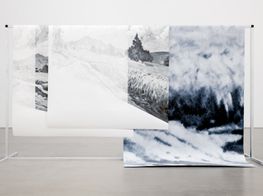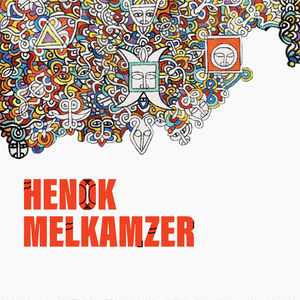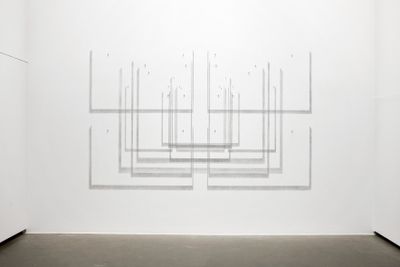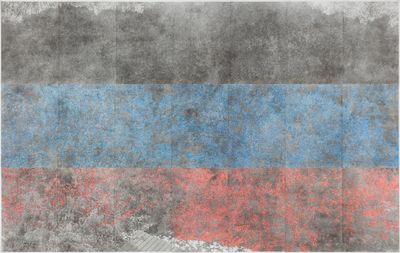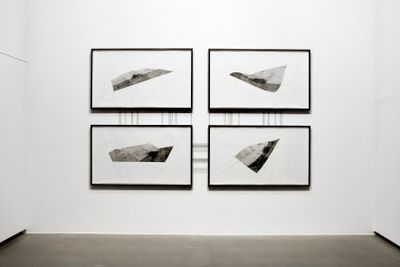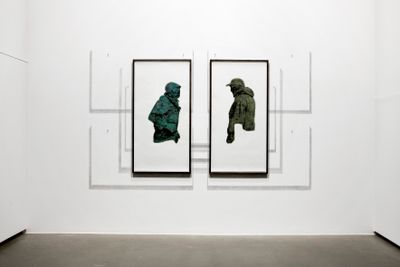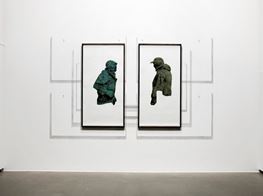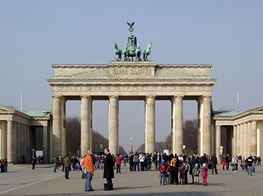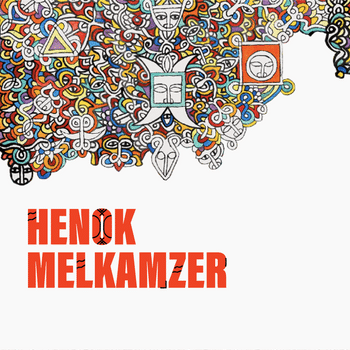Images from Abroad: Lada Nakonechna at Galerie EIGEN + ART
Lada Nakonechna's solo exhibition, Images from abroad at Galerie EIGEN + ART (9 January–20 February 2020) ostensibly takes place on an end wall of the gallery. The wall bears markings hand-drawn in graphite that evoke shadows once cast by pictures, since removed, their fixtures also left in situ. Serving as a framework of variable coordinates, these traces also suggest the transference of something temporal onto something permanent. The wall, in this case, could be thought of as a permanent 'land', while the 17 framed works stacked to the side for visitors to handle and hang in different configurations, could be considered as borders, ever shifting.
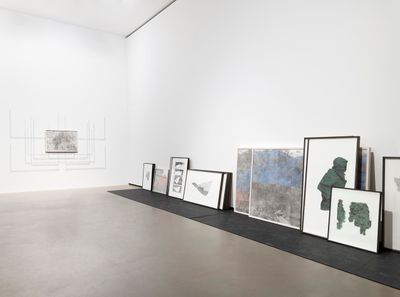
Exhibition view: Lada Nakonechna, Images from abroad, Galerie EIGEN + ART, Berlin (9 January–20 February 2020). Courtesy Galerie EIGEN + ART, Berlin. Photo: Uwe Walter, Berlin.
The only work that hangs apart from this scene is encountered on entering the gallery; predating the other works by a couple of years, it acts as an exordium. Image from abroad (2017) is a framed photograph of a river, its banks thick with bushy trees. The landscape appears generic at first. But on closer inspection, faint pixels reveal that the image, sourced from 'the collective mind' of the internet, as Nakonechna calls it, has been photographed from a monitor. The digital white hand of the editor tool floats in the treetops, as though waving for attention: a reminder that this landscape is subject to manipulation, and is by no means necessarily permanent, locatable, or 'natural'.
This sense of unease quietly develops in the main installation. In several of the stacked works, cropped selections of treetop foliage have been semi-abstracted through the process of transfer-printing their images onto paper, the tonal range reduced, so that the foliage might resemble a satellite image of a section of land. The prints are further manipulated, with sections hand-coloured in crayon—a laborious process that Nakonechna refers to as 'occupying' the picture, which has particular resonance when a block of colour sharply divides the foliage down the middle, the image now evoking a scrap of flag. Certain linear shapes might belong to a manmade ruin picked out amidst the bush in red, evoking infrared imaging.
In a single work such as Marking 2 (2019), in which three bands of colour filter over a thicket that betrays a slither of inorganic construction at the bottom edge, or when works are arranged in a particular combination, Nakonechna's colour palette could be associated with various factions at war in the Donbass region of eastern Ukraine. This is clearly a subject that informs the artist's work, though she does not make direct illustrations of the conflict. Rather, she offers viewers just enough proximity, hoping that they will consider the 'borders' or barriers that exist between spectators and depictions of conflict. The contours and perspective of undulating lands are implied with simple graphite lines on paper in four works, each titled Work on the ground 1, 2, 3 and 4 (2019). Anchored in the centre of each work and conforming to the perspective is a transfer print of a seemingly banal black and white photograph of a rural landscape, as taken from the centre of a road, which is actually a fragment of landscape from Donbass. It appears as though flattened or pasted onto the land with the lines running visibly through it, suggesting creases in a folded document or map.
Nakonechna clearly wishes to obfuscate distinctions between the picture plane of the printed photograph, the minimally suggested 'landscape', and the work's overall surface and function as an object. List of domains (2019), for example, comprises four cropped photographs that appear to show several people handling a map, but the map in each image has been erased. The blank shapes that have been left behind correlate with the shape of each photographic image in the 'Work on the ground' series. It is now understood that the shapes from the 'domains' determined the perspective of the landscapes, rather than the other way around. The erased 'maps', now only marked with a number from one to four respectively, have been scratched out by hand, the paper's surface perilously thin in places.
Lines, just like borders, are often flimsy, or perilously delicate. In two works titled Uniform image 1 and 2 (2019), the single image of a soldier, again sourced from the internet, is cropped from the waist up and transfer-printed onto white paper with the alienating effect of becoming a motif. By 'occupying' these images with green crayon, Nakonechna heightens this effect whilst rendering them as landscapes, thus returning them to nature. Yet, since soldiers' uniforms are intended to camouflage, this saturation could also be understood to re-boost their uniformity as a collective force—'invaders' or 'defenders' depending on the perspective. Such tension between occupation and erasure, and who determines the 'law of the land', appears to be at the heart of this elusive exhibition. —[O]

